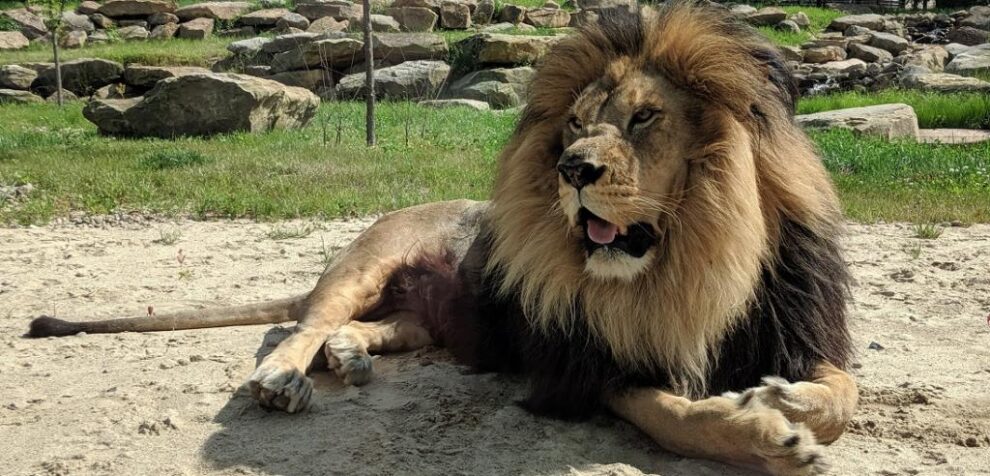Morocco’s National Institute of Archeology and Heritage (INSAP) recently discovered a 110,000-year-old Atlas Lion fossil in Essaouira.
Rabat – Rabat’s national zoo hosted today an exhibition featuring the 110,000-year-old Atlas Lion fossil recently discovered in Essaouira.
Titled “Atlas Lion: Echoes of a Roar that Spans Thousands of Years,” the exhibition featured archaeological sites where lion fossils were discovered.
The exhibition also put the spotlight on archaeological documents and historical resources about Atlas Lions’ skulls, as well as details on the lions’ hunting strategies.
Speaking with Morocco World News on the sidelines of the event, Mehdi Bensaid, Morocco’s Minister of Youth, Culture, and Communication, said, “The most recent discovery of the Atlas Lion fossil in Essaouira and the scientific work carried out by the international researchers along with the national institute will help make Morocco’s history known.”
Bensaid also lauded the researchers’ remarkable efforts over the years that led to this scientific breakthrough.
“The significance of this discovery lies in its ability to help us understand Morocco in the past,” he said, adding that “anyone wishing to build their future must first understand their past.”
Commenting on Alegria’s latest cultural appropriation of the Atlas Lions’ nickname, Bensaid stressed, “ The Atlas Lions have been present in Morocco for at least two million years; this establishes their historical connection to the country.”
He concluded: “This is a scientific approach that must not be politicized.”
The event also marked the signing of a geological heritage protection agreement between the Ministers of Youth, Culture, and Communication and Energy Transition and Sustainable Development.
On December 18, Morocco’s National Institute of Archeology and Heritage (INSAP) announced the discovery of a 110,000-year-old Atlas Lion fossil in Essaouira.
The discovery was made by an international team of experts affiliated with the institute, including archaeologists from the University of Arizona in the US, and from France’s Aix-Marseille University.
The traces of the Atlas Lion were discovered “for the first time in the history of archaeological research,” the institute said in a statement.
The Atlas lion, also known as the Barbary lion, used to be found in North Africa, in the region stretching from Morocco in the west to Egypt in the east.
Algeria’s Appropriation of Atlas Lions
Today’s exhibition comes amid Algeria’s latest cultural appropriation of Moroccan heritage.
Earlier this month, an Algerian channel claimed that Algeria’s football team deserved the “Atlas Lions” nickname more than Morocco.
Since Atlas Lions “lived in Algeria” at some point in history, an Algerian journalist claimed, the Algerian football team is more deserving of the nickname than its Moroccan counterpart.
“The Moroccan national team’s nickname, Atlas Lions, is derived from an Algerian designation… because 70% of the Atlas Mountains belong to Algeria,” the journalist told Algeria’s channel “El Heddaf.”
“Despite the absence of lions in the country, Algeria is more deserving of this moniker,” the journalist stressed.
Algeria has made previous attempts to appropriate Moroccan heritage and culture.
Adidas unveiled its Algeria culture wear in September 2022, featuring Moroccan Zellige mosaic patterns but claiming to be inspired by the “architectural design of the iconic El Mechouar palace in Tlemcen.”
In response, Morocco’s Ministry of Culture filed a lawsuit against Adidas, emphasizing that zellige is part of Morocco’s cultural heritage.
In an effort to preserve its national heritage, Morocco officially patented the Zellige of Fez by the World Intellectual Property Organization in October 2022.
King Mohammed VI has stressed the importance of preserving Morocco’s cultural heritage.
In a November 2022 meeting in Rabat with the General Director of UNESCO, Audrey Azoulay, the monarch expressed concerns about the danger and challenges of cultural appropriation that affects Morocco’s cultural and traditional heritage.
King Mohammed VI especially emphasized Morocco’s resolve and readiness to foil any initiatives aiming to undermine its identity and intangible heritage.
Source: Morocco World News
















